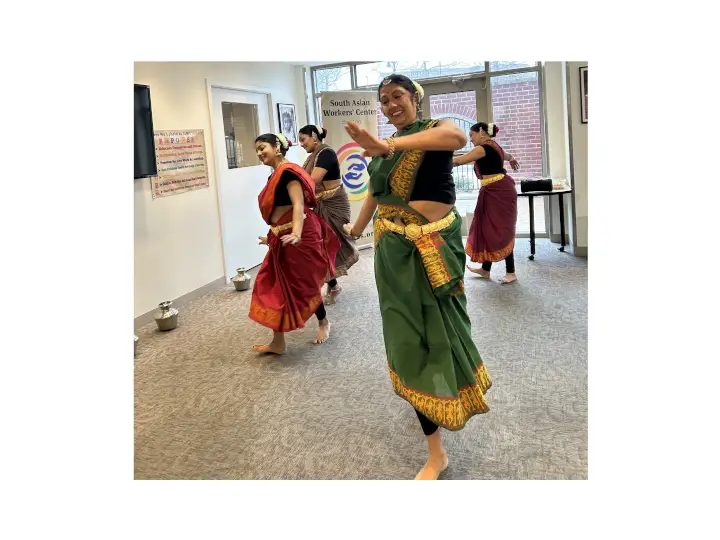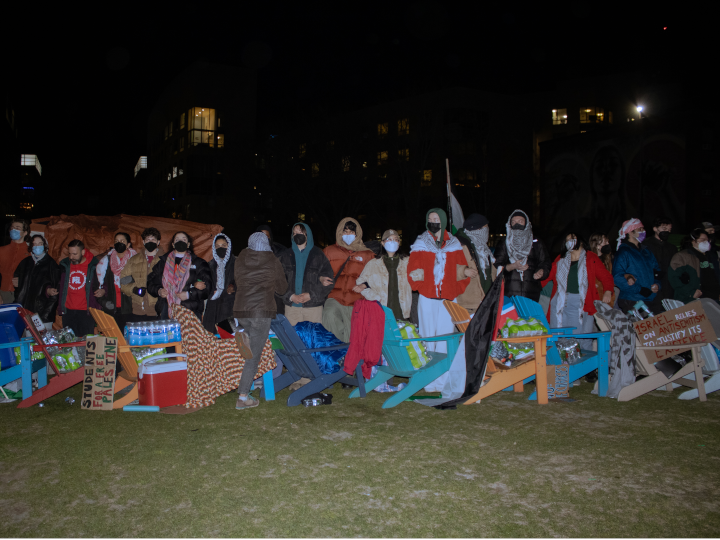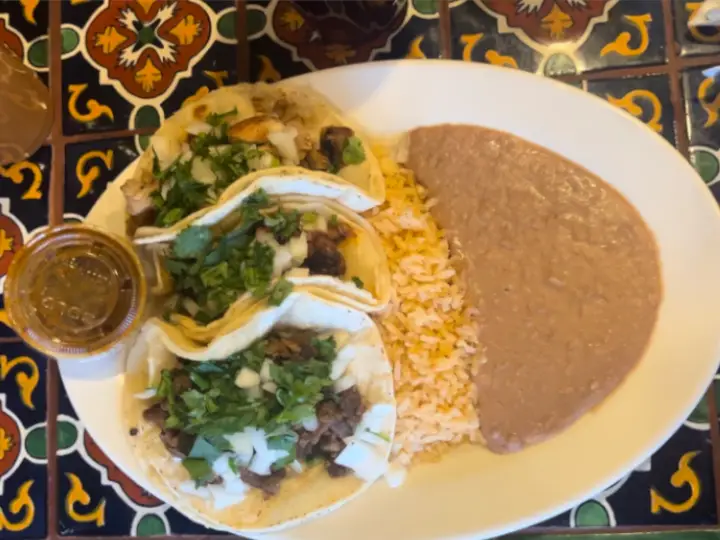Creating social connections and fostering engagement in communities is a growing challenge that we faced while doing community building work at the South Asian Workers Center- Boston. The low-income South Asian immigrant community in Boston faces challenges in housing, economic livelihood, domestic violence, healthcare—especially the mental health crisis and many more. There is an emotional void within the immigrant community living in such vulnerable situations. After hosting many “chai addas” (meetings over cups of tea) at the Center and attending many community activities, we realized how important cultural arts and storytelling are as ways to promote community capacity. So, for International Women’s Day 2024, we designed an all-day workshop for mutual empowerment at one of our community centers in Cambridge.
NATyA Dance Collective’s performance—“Stories of Sisters’ Solidarity”—fostered listening, trust, and connected our mind-body-soul. The Collective brought in unique theatrical and choreographic skills (Lakshmi/Lokita’s piece) to a simple storytelling exercise. Members enthusiastically shared their personal connections through their dance stories. The performance helped us connect the mind, body, and soul through the combination of expressive gestures, movements, and emotions. The theatrical skills combined with body movements made those tales against caste system and racial discrimination alive on the stage.
Political education from the Asian American Resource Workshop on Data Equity was something the core team at SAWC has been talking about and finding anchors to connect with. Many of our members connected with Lan’s powerful personal story of a Vietnamese immigrant living in Quincy. Many questions and concerns were raised relating to human connections, even when from different national backgrounds. Participants reported both experiences of building trust and feelings of vulnerability.
We at SAWC have realized over five years that there is competition among communities due to lack of abundant resources for the immigrant communities. Inter-group and intra-group biases and stereotypes have been observed during our many interactive sessions. Yet, communities can adapt and heal their fears and vulnerabilities by gathering for community events, talking out their issues, and discussing the evidence-based data for assessing measures of community capacity.
Most of our members at SAWC Boston are nannies, family caretakers and experts in traditional cooking. They look for opportunities for selling both raw and prepared foodstuffs in public spaces and in home-based retailing environments. Catering businesses providing nutritious, low-cost ethnic food to professional urban residents have proved to be important livelihood pathways for the immigrant women. Having access to traditional food products like homemade, authentic spices and pickles is often a challenge for busy moms as well. “Hajra Aunty” makes authentic to-go “subzi masala”, which is so helpful for my weekly cooking and brings in restaurant style flavor to the butter chicken and other Shahi curries I cook in my kitchen.
In our “chai addas,” we often discuss safety and licensing issues in informal catering businesses. Particularly with respect to traffic and hygiene issues, a proactive dialogue is established among those earning their livelihood in the informal ethnic culinary business. “Hajra Aunty” carefully boxed and labeled a few spice jars to give back to team NATyA Dance Collective, valuing their time and wonderful performance for our members. A humble thank you gesture from the team SAWC for our facilitators goes a long way in fostering friendships and emotional connections which could be helpful for the members’ business enterprises.
By focusing on cooperative business and following the moral economy concept of mutual care, SAWC provides its members with access to financing, social protection and, most of all, a secure and reliable network in which to conduct business by word of mouth. In SAWC we see that volunteerism—a specific form of community participation rooted in generativity—not only helps immigrants in handling oppression and social suffering but also leads to positive wellbeing. Some immigrants cope with nostalgia for their countries of origin, while others cope with social suffering in the space as they feel lonely and left out. Their coping is “generative” when connected to volunteerism, allowing immigrants to enact their social responsibility and to care for future generations both in their country of origin and in host societies.
Toward the end of our program, members danced and sang together to release stress and connect with each other. Even when it’s a bit out of tune and the lyrics are imperfectly remembered, such events fill an emotional void. Taking care of each other is the Center’s core philosophy. Even if our solidarity may be fractured or fragile, it’s so humbling to see the nurturing effect of SAWC-Boston uniting individuals from every part of the Indian subcontinent. Vaccine clinic was set up towards the end of the all-day workshop to address the healthcare needs of the immigrant communities. Sincere gratitude to Health Resources in Action for its support and funding.
Jyoti Sinha, PhD, is the founder and president of the South Asian Workers’ Center- Boston which was initiated in 2018. She is a full-time faculty with the sociology department and the Honors College at University of Massachusetts Boston.





